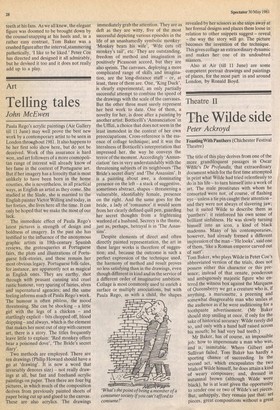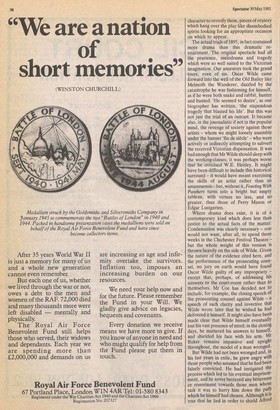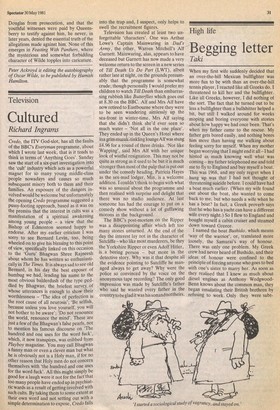Theatre II
The Wilde side
Peter Ackroyd
Feasting With Panthers (Chichester Festival Theatre) The title of this play derives from one of the more grandiloquent passages in Oscar Wilde's De Profundis, that extraordinary document which for the first time attempted in print what Wilde had tried relentlessly to do in his life— to turn himself into a work of art. The male prostitutes with whom he consorted were not, of course, of flashing eye — unless a tie pin caught their attention — and they were not always of slavering jaw; but it suited Wilde to describe them as 'panthers': it reinforced his own sense of brilliant sinfulness. He was slowly turning himself into an icon, a kind of black madonna. Many of his contemporaries, however, had already formed a different impression of the man — 'He looks', said one of them, 'like a Roman emperor carved out of Tom Baker, who plays Wilde in Peter Coe's T' abbreviated version of the trials, does not possess either this character or this presence; instead of that ornate, ponderous and ambiguously majestic figure who entered the witness box against the Marquess of Queensberry we get a creature who is, if anything, a marionette, a preening and somewhat disagreeable man who smiles at the audience as if he were auditioning for a toothpaste advertisement. (Mr Baker should stop smiling at once, if only for the sake of historical accuracy: Wilde rarely did so, and only with a hand half raised across his mouth; he had very bad teeth.) Mr Baker, has of course, an impossible job: how to impersonate a man who was, and is, inimitable. Where Gilbert and Sullivan failed, Tom Bake i has hardly a sporting chance of succeeding. In the second act, which encapsulates the two trials of Wilde himself, he does attain a kind of weary composure; and, dressed in autumnal brown (although Wilde wore black), he is at least given the opportunitY to render one or two of Wilde's set pieces. But, unhappily, they remain just that: set pieces, great compositions without a great character to revivify them, pieces of oratory which hang over the play like disembodied spirits looking for an appropriate occasion on which to appear.
The actual trials of 1895, in fact contained more drama than this dramatic reenactment. The original spectacle had all the prurience, melodrama and tragedy which were so well suited to the Victorian imagination. Our ancestors took the grand tours, even of sin. Oscar Wilde came forward into the well of the Old Bailey like Melmoth the Wanderer, dazzled by the catastrophe he was fashioning for himself, as if he were both snake and rabbit, hunter and hunted. 'He seemed to desire', as one biographer has written, 'the stupendous tragedy that blasted his life'. But this was not just the trial of an outcast. It became also, in the journalistic if not in the popular mind, the revenge of society against those artists — whom we might loosely assemble under the banner 'fin de siècle' — who were actively or indirectly attempting to subvert the received Victorian dispensation. It was bad enough that Mr Wilde should sleep with the working-classes; it was perhaps worse that he criticised W.E. Henley. It might have been difficult to include this historical surround — it would have meant exercising the skills of an artist rather than an amaneuensis— but, without it, Feasting With Panthers turns into a bright but empty tableau, with virtues no less, and no greater, than those of Perry Mason or Edgar Lustgarten, Where drama does exist, it is of a contemporary kind which does less than justice to the actual facts of the matter. Condensation was clearly necessary — one would not want, after all, to spend three weeks in the Chichester Festival Theatre — but the whole weight of this version is thrown heavily on the side of Wilde. Given the nature of the evidence cited here, and the performance of the prosecuting counsel, no jury on earth would have found Oscar Wilde guilty of any impropriety except that, perhaps, of addressing his answers to the court-room rather than to themselves. Mr Coe has decided not to include, for example, the closing speech of the prosecuting counsel against Wilde — a speech of such clarity and invective that Wilde wrote later that he wished he had delivered it himself. It might also have been made clear that Wilde himself eventuallY lost his vast presence of mind; in the closing days, he muttered his answers to himself, and shielded his face with his arm. Mr Baker remains impassive and upright throughout, the model of a man wronged. But Wilde had not been wronged and, in his last years in exile, he grew angry with those people who assumed that he had been falsely convicted. He had instigated the process which led to his eventual imprisonment, and he never betrayed any bitterness , or resentment towards those, men whose task it was to hurry him down the pat!) which he himself had chosen. Although it is true that he lied in order to shield Alfred Douglas from prosecution, and that the youthful witnesses were paid by Queensberry to testify against him, he never, in later years, denied the essential truth of the allegations made against him. None of this emerges in Feasting With Panthers, where the mysterious and somewhat forbidding character of Wilde topples into caricature.
Peter Ackroyd is editing the autobiography of Oscar Wilde, to be published by Hamish Hamilton.












































 Previous page
Previous page